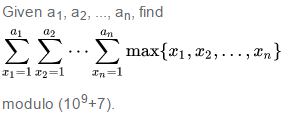Nowcoder Sum of Maximum ( 容斥原理 && 拉格朗日插值法 )
题意 :

分析 :
分析就直接参考这个链接吧 ==> Click here
大体的思路就是
求和顺序不影响结果、故转化一下思路枚举每个最大值对答案的贡献最后累加就是结果
期间计数的过程要用到容斥和多项式求和 ( 利用拉格朗日求即可 ) 具体参考给出的链接

#include<bits/stdc++.h> #define LL long long #define ULL unsigned long long #define scl(i) scanf("%lld", &i) #define scll(i, j) scanf("%lld %lld", &i, &j) #define sclll(i, j, k) scanf("%lld %lld %lld", &i, &j, &k) #define scllll(i, j, k, l) scanf("%lld %lld %lld %lld", &i, &j, &k, &l) #define scs(i) scanf("%s", i) #define sci(i) scanf("%d", &i) #define scd(i) scanf("%lf", &i) #define scIl(i) scanf("%I64d", &i) #define scii(i, j) scanf("%d %d", &i, &j) #define scdd(i, j) scanf("%lf %lf", &i, &j) #define scIll(i, j) scanf("%I64d %I64d", &i, &j) #define sciii(i, j, k) scanf("%d %d %d", &i, &j, &k) #define scddd(i, j, k) scanf("%lf %lf %lf", &i, &j, &k) #define scIlll(i, j, k) scanf("%I64d %I64d %I64d", &i, &j, &k) #define sciiii(i, j, k, l) scanf("%d %d %d %d", &i, &j, &k, &l) #define scdddd(i, j, k, l) scanf("%lf %lf %lf %lf", &i, &j, &k, &l) #define scIllll(i, j, k, l) scanf("%I64d %I64d %I64d %I64d", &i, &j, &k, &l) #define lson l, m, rt<<1 #define rson m+1, r, rt<<1|1 #define lowbit(i) (i & (-i)) #define mem(i, j) memset(i, j, sizeof(i)) #define fir first #define sec second #define VI vector<int> #define ins(i) insert(i) #define pb(i) push_back(i) #define pii pair<int, int> #define VL vector<long long> #define mk(i, j) make_pair(i, j) #define all(i) i.begin(), i.end() #define pll pair<long long, long long> #define _TIME 0 #define _INPUT 0 #define _OUTPUT 0 clock_t START, END; void __stTIME(); void __enTIME(); void __IOPUT(); using namespace std; const int maxn = 1e3 + 10; const LL mod = 1e9 + 7; LL pow_mod(LL a, LL b) { a %= mod; LL ret = 1; while(b){ if(b & 1) ret = (ret * a) % mod; a = ( a * a ) % mod; b >>= 1; } return ret; } namespace polysum { #define rep(i,a,n) for (int i=a;i<n;i++) #define per(i,a,n) for (int i=n-1;i>=a;i--) const int D=2010; LL a[D],f[D],g[D],p[D],p1[D],p2[D],b[D],h[D][2],C[D]; LL powmod(LL a,LL b){LL res=1;a%=mod;assert(b>=0);for(;b;b>>=1){if(b&1)res=res*a%mod;a=a*a%mod;}return res;} LL calcn(int d,LL *a,LL n) { // a[0].. a[d] a[n] if (n<=d) return a[n]; p1[0]=p2[0]=1; rep(i,0,d+1) { LL t=(n-i+mod)%mod; p1[i+1]=p1[i]*t%mod; } rep(i,0,d+1) { LL t=(n-d+i+mod)%mod; p2[i+1]=p2[i]*t%mod; } LL ans=0; rep(i,0,d+1) { LL t=g[i]*g[d-i]%mod*p1[i]%mod*p2[d-i]%mod*a[i]%mod; if ((d-i)&1) ans=(ans-t+mod)%mod; else ans=(ans+t)%mod; } return ans; } void init(int M) { f[0]=f[1]=g[0]=g[1]=1; rep(i,2,M+5) f[i]=f[i-1]*i%mod; g[M+4]=powmod(f[M+4],mod-2); per(i,1,M+4) g[i]=g[i+1]*(i+1)%mod; } LL polysum(LL m,LL *a,LL n) { // a[0].. a[m] \sum_{i=0}^{n-1} a[i] LL b[D]; for(int i=0;i<=m;i++) b[i]=a[i]; b[m+1]=calcn(m,b,m+1); rep(i,1,m+2) b[i]=(b[i-1]+b[i])%mod; return calcn(m+1,b,n-1); } LL qpolysum(LL R,LL n,LL *a,LL m) { // a[0].. a[m] \sum_{i=0}^{n-1} a[i]*R^i if (R==1) return polysum(n,a,m); a[m+1]=calcn(m,a,m+1); LL r=powmod(R,mod-2),p3=0,p4=0,c,ans; h[0][0]=0;h[0][1]=1; rep(i,1,m+2) { h[i][0]=(h[i-1][0]+a[i-1])*r%mod; h[i][1]=h[i-1][1]*r%mod; } rep(i,0,m+2) { LL t=g[i]*g[m+1-i]%mod; if (i&1) p3=((p3-h[i][0]*t)%mod+mod)%mod,p4=((p4-h[i][1]*t)%mod+mod)%mod; else p3=(p3+h[i][0]*t)%mod,p4=(p4+h[i][1]*t)%mod; } c=powmod(p4,mod-2)*(mod-p3)%mod; rep(i,0,m+2) h[i][0]=(h[i][0]+h[i][1]*c)%mod; rep(i,0,m+2) C[i]=h[i][0]; ans=(calcn(m,C,n)*powmod(R,n)-c)%mod; if (ans<0) ans+=mod; return ans; } } LL arr[maxn]; int main(void){__stTIME();__IOPUT(); int n; polysum::init(maxn); while(~sci(n)){ for(int i=1; i<=n; i++) scl(arr[i]); sort(arr+1, arr+1+n); arr[0] = 0; LL now = 1; LL b[maxn]; LL ans = 0; for(int i=1; i<=n; i++){ if(arr[i] == arr[i-1]){ now = (now * arr[i]) % mod; continue; } b[0] = 0; for(int j=1; j<=n-i+1; j++) b[j] = (LL)j * ((pow_mod((LL)j, n-i+1) - pow_mod((LL)j-1LL, n-i+1)%mod)+mod)%mod; LL tmp = ((polysum::polysum(n-i+1, b, arr[i]+1) - polysum::polysum(n-i+1, b, arr[i-1]+1)%mod)+mod)%mod; ans = (ans + (tmp%mod * now%mod)%mod)%mod; now = (now * arr[i]) % mod; } printf("%lld\n", ans); } __enTIME();return 0;} void __stTIME() { #if _TIME START = clock(); #endif } void __enTIME() { #if _TIME END = clock(); cerr<<"execute time = "<<(double)(END-START)/CLOCKS_PER_SEC<<endl; #endif } void __IOPUT() { #if _INPUT freopen("in.txt", "r", stdin); #endif #if _OUTPUT freopen("out.txt", "w", stdout); #endif }
注 :
N + 1 个点能确定一个 N 次多项式、故拉格朗日插值需要确定 ( 最高次次数 + 1 ) 个点的值

namespace polysum { #define rep(i,a,n) for (int i=a;i<n;i++) #define per(i,a,n) for (int i=n-1;i>=a;i--) const int D=2010;//可能需要用到的最高次 LL a[D],f[D],g[D],p[D],p1[D],p2[D],b[D],h[D][2],C[D]; LL powmod(LL a,LL b){LL res=1;a%=mod;assert(b>=0);for(;b;b>>=1){if(b&1)res=res*a%mod;a=a*a%mod;}return res;} LL calcn(int d,LL *a,LL n) { // a[0].. a[d] a[n] if (n<=d) return a[n]; p1[0]=p2[0]=1; rep(i,0,d+1) { LL t=(n-i+mod)%mod; p1[i+1]=p1[i]*t%mod; } rep(i,0,d+1) { LL t=(n-d+i+mod)%mod; p2[i+1]=p2[i]*t%mod; } LL ans=0; rep(i,0,d+1) { LL t=g[i]*g[d-i]%mod*p1[i]%mod*p2[d-i]%mod*a[i]%mod; if ((d-i)&1) ans=(ans-t+mod)%mod; else ans=(ans+t)%mod; } return ans; } void init(int M) {//用到的最高次 f[0]=f[1]=g[0]=g[1]=1; rep(i,2,M+5) f[i]=f[i-1]*i%mod; g[M+4]=powmod(f[M+4],mod-2); per(i,1,M+4) g[i]=g[i+1]*(i+1)%mod; } LL polysum(LL m,LL *a,LL n) { // a[0].. a[m] \sum_{i=0}^{n-1} a[i] for(int i=0;i<=m;i++) b[i]=a[i]; b[m+1]=calcn(m,b,m+1); rep(i,1,m+2) b[i]=(b[i-1]+b[i])%mod; return calcn(m+1,b,n-1); } LL qpolysum(LL R,LL n,LL *a,LL m) { // a[0].. a[m] \sum_{i=0}^{n-1} a[i]*R^i if (R==1) return polysum(n,a,m); a[m+1]=calcn(m,a,m+1); LL r=powmod(R,mod-2),p3=0,p4=0,c,ans; h[0][0]=0;h[0][1]=1; rep(i,1,m+2) { h[i][0]=(h[i-1][0]+a[i-1])*r%mod; h[i][1]=h[i-1][1]*r%mod; } rep(i,0,m+2) { LL t=g[i]*g[m+1-i]%mod; if (i&1) p3=((p3-h[i][0]*t)%mod+mod)%mod,p4=((p4-h[i][1]*t)%mod+mod)%mod; else p3=(p3+h[i][0]*t)%mod,p4=(p4+h[i][1]*t)%mod; } c=powmod(p4,mod-2)*(mod-p3)%mod; rep(i,0,m+2) h[i][0]=(h[i][0]+h[i][1]*c)%mod; rep(i,0,m+2) C[i]=h[i][0]; ans=(calcn(m,C,n)*powmod(R,n)-c)%mod; if (ans<0) ans+=mod; return ans; } }
-------------------------------分 割 线-------------------------------
链接题解用到的化简容斥的多项式展开式如下
( x - 1 ) ^ k
= x^k
+ C(k, 1) * x^(k-1) * (-1)^1
+ C(k, 2) * x^(k-2) * (-1)^2
+ ......
+ C(k, k) * x^(k-k) * (-1)^k





